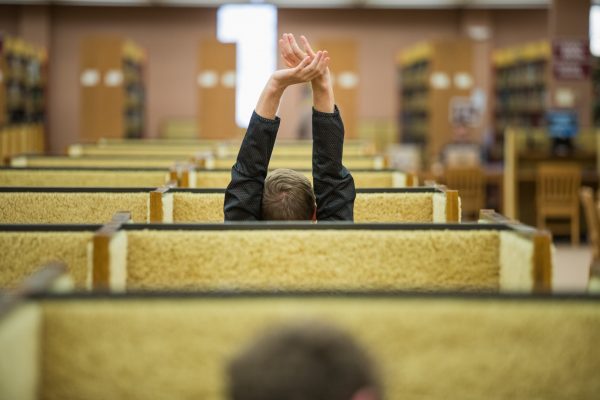The alarm goes off. “Impossible,” you think. “I went to bed thirty minutes ago.” You only slept for thirty minutes because you stayed up finishing that project you procrastinated on all week.
As you navigate through your day, you keep sinking into an ocean of fatigue—and soon you’re drowning. You can’t pay attention in class, and your puffy eyes hurt. Sleep deprivation feels awful.
One of my friends studied both graphic design and procrastination. His long procrastination sessions resulted in all-nighters, distracted friends (me), and lots of fatigue and caffeine.
“Procrastination makes easy things hard, hard things harder.” Mason Cooley, the witty professor and writer, summarized how procrastination ruins our lives. We know procrastinating is bad, but how can people like my friend avoid it?
Know Yourself
What habits cause procrastination in your life? Maybe spending too much time on social media. Or maybe taking those ten-minute study breaks that become hour-long conversations with your dorm squad.
Everyone procrastinates differently. If you identify your procrastination style, you can identify your weak spots. Check how many hours you spend procrastinating on a normal day. Follow Socrates’s advice and “know yourself.”
Limit Distractions
Why did you procrastinate on your last project? You started well. You were driven and focused—until a friend stopped by to say hi. Fifteen minutes later, two more friends stopped by. Three hours and two pizzas later, you were too distracted—and tired—to work on your project.
If you want to avoid procrastination, you need to limit distractions. Sometimes you can study in the dorms, but you may struggle to stay focused. Instead, choose distraction-free study spots like the library or your dorm study lounge.
Philip Adams, an academic coach and first year advisor, said that “students need to try various [study] locations until they find one where they can be most productive.”
Put your phone away or on airplane mode. If you need to use your laptop, install website blockers. These won’t let you access distracting websites—like Facebook and Youtube—while doing homework or studying. Reduce distractions, and you’ll avoid procrastination.
Divide and Conquer
Think about the last time you worked on a big project. You felt stressed when you thought of spending hours facing a screen, robotically typing dull information about a topic you hated. So you escaped—you procrastinated.
Most people need short study breaks. The Pomodoro technique works for me—using a timer, work for twenty-five minutes and then take a five-minute break. Repeat until you finish your task. Working in short spurts will keep you refreshed and help you avoid procrastination.
Also, break up your study load. If you use a planner to divide your big projects into smaller, more doable tasks, you’ll be less tempted to procrastinate. Instead of writing a paper in one sitting, write it over several days. Divide and conquer.
Develop a Good Study Routine
School and home—those were the basic divisions of your normal high school day. But in college, schedules aren’t as rigid. They’re more flexible than ever.
With classes meeting as early as 8 a.m. and as late as 4 p.m., developing a good study routine—and not procrastinating—has never been harder. You can model your own study timetable after your class schedule. Devote specific time slots to studying and homework.
Adams suggested starting with your least favorite tasks to get them out of the way. He said that “the longer you put them off, the less pleasant they become, and then they get neglected and often missed.”
Developing a good study routine helps you manage your time better. If you can stick to your timetable, you can get your schoolwork done. And if you can keep up with your schoolwork, you can avoid procrastination.
Reward Yourself
“When I finish writing the first page, I’ll get my favorite latte,” is what I told myself while writing a short story for my Creative Writing class. The promise of warm, frothy milk and tasty vanilla helped me endure the pains of writing—and avoid procrastination.
People train dogs by giving them treats—rewards. People learn the same way. If you work hard and reward yourself with something you like—candy, funny cat videos, time with friends, a walk—then you’ll want to keep working hard as a result.
Confront Your Fears
Bill Knaus, Ed.D., author of the book Overcoming Procrastination, said that you become your worst enemy when perfectionism and procrastination combine. Fueled by fear, these evil twins can ruin your life.
Perfectionists fear they won’t be good enough. But this fear fuels stress, and stress fuels the desire to procrastinate—it’s a vicious cycle. Instead of trying to be perfect, set realistic goals for yourself. You’re only human. Breathe.
Confront the fears that make you procrastinate. Be honest and write them down. If you fear failure but never take the first step, then you won’t get anything done. “A person can gain much [experience] from failure as long as there is a positive, growth mindset,” Adams said.
Relax
Relax! The other option is stressing out and procrastinating as a result. Learning how to avoid procrastination is a process—take it one step at a time.
If you feel overwhelmed, take a break. I don’t relax when I need to—don’t be like me. If you’ve worked hard and feel tired, relax. It’ll help you in the long run.
“Never leave that till tomorrow which you can do today,” Benjamin Franklin said. In the end, you just need to get your work done now.








